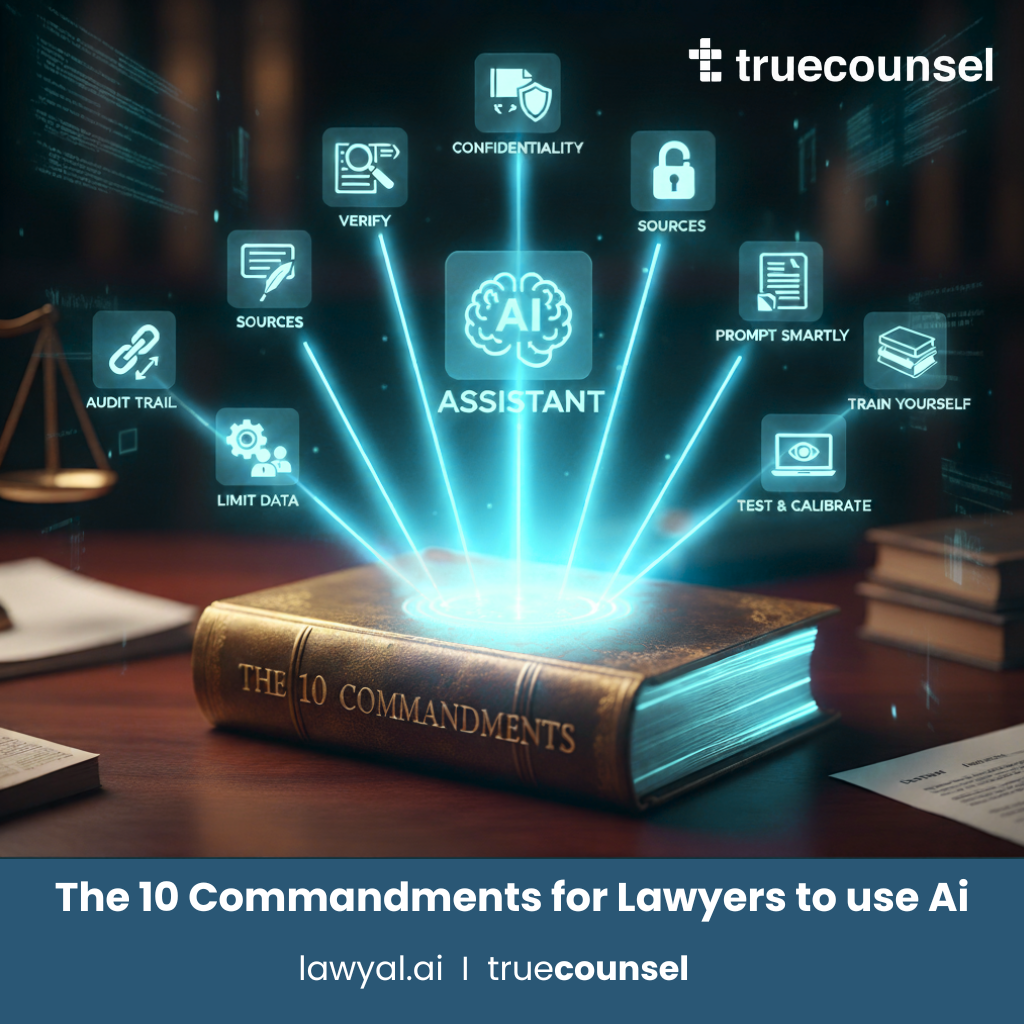
Artificial intelligence (AI) is transforming the way lawyers review, analyze, and red-line contracts. Tools like lawyal.ai (truecounsel’s in-house legal assistant) can speed up workflows, reduce repetitive tasks, and surface potential risks with impressive efficiency. But like any powerful tool, AI requires careful handling. Lawyers must remain firmly in control, ensuring professional, ethical, and client standards are met.
Here are 10 guiding commandments for lawyers who want to get the best out of AI-powered contract review, with deeper insights and practical tips especially for budding lawyers:
AI is a support tool, not a substitute for judgment. Think of it as a bright but inexperienced junior. You remain the lawyer of record; the responsibility is always yours. This mindset keeps you alert, accountable, and professional.
AI can be fast, but speed without accuracy is dangerous. Always double-check citations, definitions, dates, numbers, and clause cross-references against the source. Use this as an exercise to sharpen your eye for detail—a skill that separates average lawyers from great ones.
Client trust is your currency. Don’t erode it by being careless with data. Learn your firm’s approved AI tools and security practices. When in doubt, ask. This habit of caution trains foresight—a key legal skill.
AI’s value increases when you can see why it made a suggestion. Prefer platforms that highlight the exact clause or precedent. This reinforces your ability to reason logically and connect evidence with conclusions—a skill critical in both drafting and advocacy.
Prompting is nothing new for lawyers; it’s essentially briefing. The clearer the instructions, the better the output—whether briefing AI, a senior associate, or a senior advocate. Practical steps: – Frame prompts like research questions: “Identify termination clauses that may be one-sided and suggest balanced alternatives.” – Ask AI itself: “Suggest prompts to review this contract for indemnity risks under Indian law.” – Keep a prompt journal. Over time, you’ll see patterns, and your prompts will get sharper.
Remember: good prompting flows from good thinking. You can’t brief AI well unless you’ve read, researched, and thought deeply about the matter.
Law is about accountability. Keep records of what you asked AI, what it produced, and how you modified it. This habit also helps you develop foresight—if asked later, you can retrace your reasoning and show the logic behind your edits.
Don’t upload entire deal rooms or confidential strategies into generic AI tools. Instead, extract the relevant section, analyze that, and confirm with your seniors if unsure. This practice sharpens your judgment about relevance—an underrated but crucial skill.
If you used AI in your workflow, disclose it appropriately. For juniors, transparency with seniors builds credibility. Say: “I used lawyal.ai to flag indemnity risks, then verified them manually.” Honesty will earn you trust and mentoring.
Try different prompts, compare outputs, and even ask AI to critique itself: “List the assumptions you made in flagging these clauses.” Then run it by a senior or peer. This iterative process develops your logical reasoning and ability to think from both sides of the argument.
AI accelerates, but it doesn’t replace fundamentals. To improve as a lawyer: – Read widely: case law, statutes, judgments, and well-drafted contracts. Reading builds foresight and exposes you to diverse reasoning styles. – Write regularly: summaries, notes, or even LinkedIn posts. Good writing is the mirror of good thinking. Without clarity in writing, your prompts and AI outputs will remain weak. – Think for both sides: when AI flags an issue, ask yourself, “How would the counterparty defend this clause?” That dual perspective strengthens negotiation skills. – Do focused research: don’t just skim search results. Learn to dig into primary sources. AI may give you a head start, but depth comes only from old-fashioned research. – Spend time on the craft: avoid the temptation to let AI do it all. Time invested in reading and analyzing each project is irreplaceable. This is how you sharpen judgment.
In short: AI changes the tools, not the essence of becoming a good lawyer. The skills that mattered yesterday—detail, foresight, reasoning, writing, and research—still matter today. AI amplifies these skills only if you actively practice and refine them.
AI is not replacing lawyers—it’s reshaping how we practice. By combining smart use of AI tools like lawyal.ai with timeless legal skills—attention to detail, foresight, logical reasoning, balanced thinking, and strong writing—young lawyers can accelerate their growth without compromising quality. The fundamentals remain unchanged: law still rewards those who read deeply, think clearly, and write persuasively. The pen may have changed, but the craft of lawyering has not.
Built for lawyers. Powered by truecounsel.